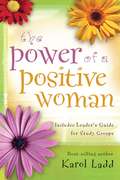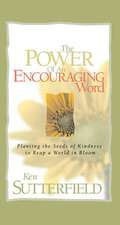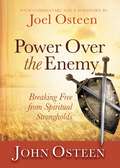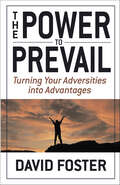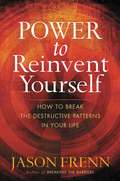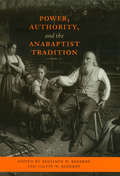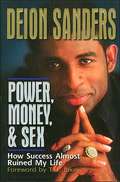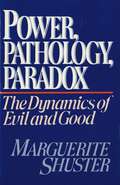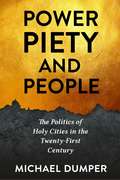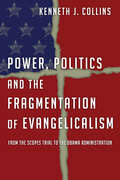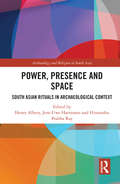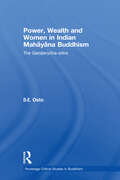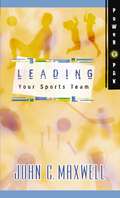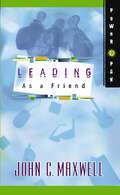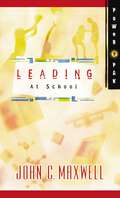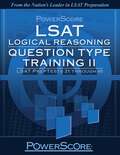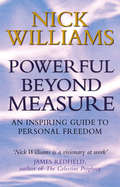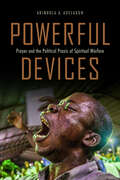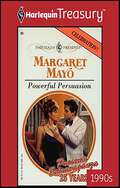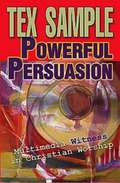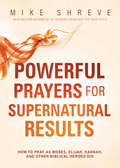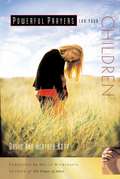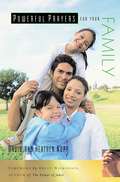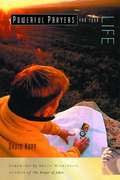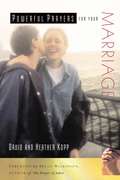- Table View
- List View
Power of a Positive Woman
by Karol LaddDo you want to be a positive woman of powerful influence? Do you want to make a lasting impression on the lives of the people around you? You can become a positive woman -- no matter where you find yourself right now -- simply by choosing to allow God's power and strength to pour through you. This life-changing book explores seven principles that can help you become a powerful force in your family, your church, your community, and your world. Through biblical teaching, inspirational quotes, and true stories of women just like you, you will learn to incorporate your life as you have a powerful impact on those around you. Every woman -- including you -- has the potential to become a positive, powerful influence in her world. Never underestimate the power of a positive woman. That woman can be you!
Power of an Encouraging Word, The
by Ken SutterfieldThink of the half-dozen times in your life when a bit of encouragement carried you for a long time. A word or card here and there boosted your confidence and outlook. It just made you feel good. But you know what they say, it's better to give than to receive. If only we realize the impact a well-placed note of support and motivation can have on the people around us. It might spur them on to achieve great things! Or at least lift a chin off a chest. Best-selling author Ken Sutterfield believes passionately that we are to encourage one another and look for people who need an encouraging word. These stories illustrate the impact well-timed words have had on various lives. Read them for your own enjoyment, then go out and practice!
Power over the Enemy: Breaking Free from Spiritual Strongholds
by Joel Osteen John Osteen"Forgive one another lest Satan should take advantage of us; for we are not ignorant of his devices." 2 Corinthians 2:11Today's Christians are largely ignorant of Satan's evil. It's why multitudes of Christians are tormented with fears, bound by addictions and sins, and torn by relationship problems. But God has given you the ultimate victory. In this life-changing book, John Osteen teaches you how to have power over the enemy when the Tempter comes, how Jesus dealt with temptation, how to engage in spiritual warfare, how to demonstrate Satan's defeat, how to live a life of victory, and so much more.Using practical, biblical knowledge of what you have through the great redemption in Jesus Christ and all that God has provided for you in His Word, power will come. As you become knowledgeable about the true supernatural power of God, you will rise to victory in every area of your life.
Power to Prevail: Turning Your Adversities into Advantages
by David FosterIn The Power to Prevail, David Foster explores the paradox of adversity.
Power to Reinvent Yourself: How to Break the Destructive Patterns in Your Life
by Jason FrennEvangelist and author Jason Frenn details five steps accessing Christ's power to break the chains of destructive patterns that afflict generation after generation. Many families suffer from dysfunction and conflict handed down from one generation to the next, and the cycle repeats itself with greater and greater severity. Parents struggle to keep their families from eroding as they helplessly watch their kids, teenagers, and adult children fall into overwhelming patterns of self-destruction. But there is a power that can set these families free and change their future. In this book, readers experience the story of the author and his family, and how he was rescued from destruction. Each reader can find the POWER TO REINVENT YOURSELF and obtain a life of significance, success, and victory!
Power, Authority, and the Anabaptist Tradition (Center Books in Anabaptist Studies)
by Benjamin W. Redekop and Calvin W. RedekopFounded in part on a rejection of "worldly" power and the use of force, Anabaptism carried with it the promise of redemptive power. Yet the attempt to banish worldly power to the margins of the Christian community has been fraught with dilemmas, contradictions, and, at times, blatant abuses of authority. In this groundbreaking book, Benjamin W. Redekop, Calvin W. Redekop, and their coauthors draw on classic and contemporary thinking to confront the issue of power and authority in the Anabaptist-Mennonite community. From the power relationships of the sixteenth-century Peasants' War to issues of contemporary sexuality, the topics of Power, Authority, and the Anabaptist Tradition are sure to interest a wide audience.Contributors: Stephen C. Ainlay, College of the Holy Cross • J. Lawrence Burkholder, President Emeritus, Goshen College • Lydia Neufeld Harder, Toronto School of Theology • Joel Hartman, University of Missouri • Jacob A. Loewen, missionary, retired • Dorothy Yoder Nyce, Writer and former Assistant Professor, Goshen College • Lynda Nyce, Bluffton College • Wesley Prieb (deceased), former dean, Tabor College • Benjamin W. Redekop, Kettering University • Calvin W. Redekop, Conrad Grebel College, emeritus • James M. Stayer, Queen's University, Ontario
Power, Money and Sex: How Success Almost Ruined My Life
by Deion Sanders Jim Nelson BlackSuperstar Deion Sanders tells his powerful life story and reveals how power, money and sex could not satisfy the void in his life--a void ultimately satisfied by his relationship with Christ.
Power, Pathology, Paradox: The Dynamics of Evil and Good
by Marguerite ShusterThis brilliant and original study explores the problem of psychopathology in the context of the larger problem of evil. Dr. Shuster places the problem squarely within the theological framework of spiritual warfare, focusing on power as the key element. The book is divided into four parts. The first of these examines various views of the nature of reality. The other three sections deal with power, pathology, and paradox, respectively. The section on power functions as a “hinge,” since it defines the paradigm that is implicit in the preceding chapters and explicitly governs the chapters that follow. The section on pathology establishes “evil” (of which psychopathology is a part) as a spiritual and moral category rather than as a scientific and empirical one. The final three chapters explore “a radical, paradoxical, Christian view of health whereby the power of Satan is conceived as being countered not by a like power but by the Word and Spirit of God operative through human weakness.” This challenging and at times unsettling book will repay the thoughtful reader with a clearer insight into what is perhaps the most perplexing problem of human existence—the problem of evil.
Power, Piety, and People: The Politics of Holy Cities in the Twenty-First Century
by Michael DumperConflicts in cities that have particular religious significance often become intense, protracted, and violent. Why are holy cities so frequently contested, and how can these conflicts be mediated and resolved?In Power, Piety, and People, Michael Dumper explores the causes and consequences of contemporary conflicts in holy cities. He explains how common features of holy cities, such as powerful and autonomous religious hierarchies, income from religious endowments, the presence of sacred sites, and the performance of ritual activities that affect other communities, can combine to create tension.Power, Piety, and People offers five case studies of important disputes, beginning with Jerusalem, often seen as the paradigmatic example of a holy city in conflict. Dumper also discusses Córdoba, where the Islamic history of its Mosque-Cathedral poses challenges to the control exercised by the Roman Catholic Church; Banaras, where competing Muslim and Hindu claims to sacred sites threaten the fragile equilibrium that exists in the city; Lhasa, where the Communist Party of China severely restricts the ancient practice of Tibetan Buddhism; and George Town in Malaysia, a rare example of a city with many different religious communities whose leaders have successfully managed intergroup conflicts. Applying the lessons drawn from these cities to a broader global urban landscape, this book offers scholars and policy makers new insights into a pervasive category of conflict that often appears intractable.
Power, Politics and the Fragmentation of Evangelicalism: From the Scopes Trial to the Obama Administration
by Kenneth J. CollinsKenneth J. Collins tells the narrative history of the political and cultural fortunes of American evangelicalism from the late nineteenth century through the contemporary era. He traces the establishment of the evangelical enterprise in American culture and its influences on the political and social values of the American landscape throughout the twentieth century, as well as its fragmentation into competing ideological camps. Underlining how both sides of the liberal-conservative divide have diluted their message through political idioms, Collins suggests a way forward for evangelical political identity that avoids the pitfalls of fundamentalism and liberalism. Will American evangelicalism outlive its partisan history? As Kenneth Collins tells the story, there is reason to think so.
Power, Presence and Space: South Asian Rituals in Archaeological Context (Archaeology and Religion in South Asia)
by Himanshu Prabha Ray Henry Albery Jens-Uwe HartmannPatterns of ritual power, presence, and space are fundamentally connected to, and mirror, the societal and political power structures in which they are enacted. This book explores these connections in South Asia from the early Common Era until the present day. The essays in the volume examine a wide range of themes, including a genealogy of ideas concerning Vedic rituals in European thought; Buddhist donative rituals of Gandhara and Andhra Pradesh in the early Common Era; land endowments, festivals, and temple establishments in medieval Tamil Nadu and Karnataka; Mughal court rituals of the Mughal Empire; and contemporary ritual complexes on the Nilgiri Plateau. This volume argues for the need to redress a historical neglect in identifying and theorising ritual and religion in material contexts within archaeology. Further, it challenges existing theoretical and methodological forms of documentation to propose new ways of understanding rituals in history. This volume will be of great interest to scholars and researchers of South Asian history, religion, archaeology, and historical geography.
Power, Wealth and Women in Indian Mahayana Buddhism: The Gandavyuha-sutra (Routledge Critical Studies in Buddhism)
by Douglas OstoThis book examines the concepts of power, wealth and women in the important Mahayana Buddhist scripture known as the Gandavyuha-sutra, and relates these to the text’s social context in ancient Indian during the Buddhist Middle Period (0–500 CE). Employing contemporary textual theory, worldview analysis and structural narrative theory, the author puts forward a new approach to the study of Mahayana Buddhist sources, the ‘systems approach’, by which literature is viewed as embedded in a social system. Consequently, he analyses the Gandavyuha in the contexts of reality, society and the individual, and applies these notions to the key themes of power, wealth and women. The study reveals that the spiritual hierarchy represented within the Gandavyuha replicates the political hierarchies in India during Buddhism’s Middle Period, that the role of wealth mirrors its significance as a sign of spiritual status in Indian Buddhist society, and that the substantial number of female spiritual guides in the narrative reflects the importance of royal women patrons of Indian Buddhism at the time. This book will appeal to higher-level undergraduates, postgraduates and scholars of religious studies, Buddhist studies, Asian studies, South Asian studies and Indology.
PowerPak Collection Series: Leading Your Sports Team
by John MaxwellImagine a school where the leaders in student government, academics, the arts, and sports brought out the best in themselves and their peers. Impossible?? Maybe not!Tommy Nelson's new PowerPak series by John C. Maxwell adapts for ages 10 - 14 the leadership techniques from Maxwell's New York Times bestseller Developing the Leader within You.In the PowerPak series, Maxwell gives a simple step-by-step plan for any young person to learn leadership skills before reaching high school or college. Topics covered include peer relationships, influence, priorities, integrity, problem solving, and self-discipline.
PowerPak Collection Series: Leading as a Friend
by John MaxwellImagine a school where the leaders in student government, academics, the arts, and sports brought out the best in themselves and their peers. Impossible?? Maybe not!Tommy Nelson's new PowerPak series by John C. Maxwell adapts for ages 10 - 14 the leadership techniques from Maxwell's New York Times bestseller Developing the Leader within You.In the PowerPak series, Maxwell gives a simple step-by-step plan for any young person to learn leadership skills before reaching high school or college. Topics covered include peer relationships, influence, priorities, integrity, problem solving, and self-discipline.
PowerPak Collection Series: Leading at School
by John MaxwellImagine a school where the leaders in student government, academics, the arts, and sports brought out the best in themselves and their peers. Impossible?? Maybe not!Tommy Nelson's new PowerPak series by John C. Maxwell adapts for ages 10 - 14 the leadership techniques from Maxwell's New York Times bestseller Developing the Leader within You.In the PowerPak series, Maxwell gives a simple step-by-step plan for any young person to learn leadership skills before reaching high school or college. Topics covered include peer relationships, influence, priorities, integrity, problem solving, and self-discipline.
PowerScore LSAT: Logical Reasoning Question Type Training Vol. 2
by David M. Killoran Steven G. SteinLSAT Logical Reasoning Question Type Training, Volume 2 by PowerScore is a book where you will find every Logical Reasoning question from LSAT PrepTests 21 through 40, arranged in groups according to the classification system used in the renowned PowerScore LSAT Logical Reasoning Bible.
Powerful Beyond Measure
by Nick WilliamsFor many of us, the word 'power' conjures up disturbing feelings of control and dominance, of winning at all costs - and often at the expense of others. Indeed, from our earliest days this is how we have been taught to view the world in order to survive; it is at the heart of the story of man's evolution, and at the heart of much conflict and pain. But now, in Powerful Beyond Measure, Nick Williams reveals the basis of a different kind of power - a power that does not rely on winners or losers, but on a love that feeds our soul and a faith that frees us from the need to control.Here, as he draws upon fascinating case studies and timeless wisdom, Nick reveals how we can: ·Access the innate spiritual power that lies within each of us to find strength and inspiration every day of our lives·Experience true connection with the world around us as we learn to trust ourselves and others·Abandon our fears and doubts in order to discover the essence of who we truly are and all that we have to offerComplete with sound, practical advice and based on his experience as one of our most sought-after personal coaches, Nick Williams illuminates the path to a more rewarding life of hope, forgiveness and freedom - a life that is powerful beyond measure.'Read and learn how to save your life, live in your heart and let the magic happen...' Bernie Siegel, author of Love, Medicine and Miracles
Powerful Devices: Prayer and the Political Praxis of Spiritual Warfare
by Abimbola Adunni AdelakunPowerful Devices studies spiritual warfare performances as an apparatus for disestablishing structures of power and knowledge, and establishing righteousness in their stead. Drawing on performance studies’ emphasis on radicality and breaking of social norms as devices of social transformation, the book demonstrates how Christian groups with dominant cultural power but who perceive themselves as embattled wield the ideas of performance activism. Combining religious studies with ethnography, Powerful Devices explores Nigerian Pentecostals and US Evangelicals’ praxis of transnational spiritual warfare. By closely studying spiritual warfare prayers as a “device,” Powerful Devices shows how the rituals of prayer enable an apprehension of time, paradigms of self-enhancement, and the subversion of politics and authority. A critical intervention, Powerful Devices explores charismatic Christianity’s relationship to science and secular authority, technology and temporality, neoliberalism, and reactionary ideology.
Powerful Persuasion
by Margaret Mayo"Will you take the job, Celena?"That was how it all started-when Luciano Segurini persuaded Celena to work for him for triple her current salary. But before she knew it, he had persuaded her to pose as his fiancée-and eventually to become his wife. Yet their marriage was bittersweet-full of passion by night, and misunderstandings by day. Not an easy marriage, by any means-and then, of course, there was Simone!
Powerful Persuasion: Multimedia Witness in Christian Worship
by Prof. Tex SampleWhen it comes to communicating the gospel through new media and technologies, churches are often faced with one of two bad options. Either they can reject these new vehicles for sharing the faith as “not the way we’ve always done it”; or they can uncritically embrace them, failing to see that when not understood properly these media can obscure the gospel message just as much as they can communicate it. If they are going to reach the generations formed by electronic culture, churches must engage in a new evangelism, one that makes use of new technologies and cultural expressions. Sample explains how the electronic generations receive and process the information communicated by new media, and how the ways in which our consumerist culture makes use of those media are not good models for how the church can employ them to spread the message of Jesus Christ.Read the Introduction now!
Powerful Prayers for Supernatural Results: How to Pray as Moses, Elijah, Hannah, and Other Biblical Heroes Did
by Mike ShreveBring a new power and vitality to your prayer life. With these dynamic prayers from biblical heroes Mike Shreve encourages readers to expect the miraculous when they pray. Highlighting specifically those times when a person’s petitions resulted in supernatural breakthrough, each chapter will cover a specific prayer, break it down into its primary components, and show why it touched the heart of God, providing readers with encouragement and proof that prayer really works and can truly change their circumstances and their lives. God is the same yesterday, today, and forever, and He will continue to move in our lives if we dare to believe. Your prayer life will be lifted to the next level. Your walk with God will be altered forever. Miracles are waiting in the wings.
Powerful Prayers for Your Children (Powerful Prayers Series)
by Heather Kopp David KoppFrom Spelling Tests to Future Mates-Learn to Pray for Every Aspect of Your Kids' Lives.AS A PARENT, you want your prayers to have an impact on the lives of your children. But how can you ensure that will happen? What are some of the vital things you should pray for? How can you claim God's glorious promises for your kids? In Powerful Prayers for Your Children, you'll find the answers to these questions, along with rich, Scripture-based prayers that will show you how to communicate more confidently, more fervently, and more effectively with the Lord. Most important, your prayer life will be forever changed as you learn to pray more intimately and wisely to the One who loves your children most of all.From the Trade Paperback edition.
Powerful Prayers for Your Family (Powerful Prayers Series)
by David Kopp Heather KoppBecome the Family That Prays Together. AROUND THE WORLD, married couples, parents, and individuals have learned to pray powerful prayers for their children, their spouses, their babies, their marriages, and their own lives, aided by the spiritual encouragement and guidance of husband-and-wife team David Kopp and Heather Harpham Kopp. Now, praying with power becomes a fun-filled family affair with the help of kid-friendly activities and ideas. Designed to capture the kids’ interest and meet many of mom and dad’s core spiritual needs, this fun, story-oriented devotional tool is perfect for every parent and child who wants to have a vital, Bible-based prayer life. This practical guide includes key scriptures, prayer and devotional text, Bible trivia, prayers for special occasions, “truth to go,” and more for the spiritually growing family.
Powerful Prayers for Your Life (Powerful Prayers Series)
by Heather Kopp David KoppShift Your Prayer Life into High Gear.EACH OF US HUNGERS to experience a fresh and infinitely rich relationship with God. We long to share with Him our deepest hearts-to know that we can "approach the throne of grace with confidence, so that we may receive mercy and find grace to help us in our time of need" (Hebrews 4:16). In Powerful Prayers for Your Life, you'll find ways to expand your prayer language and honestly express to God the desires and issues you encounter every day. Not only will this book show you how to use Bible passages and stories to help you express your feelings, worries, requests, and worship, it will reveal how Scripture can speak back to you powerful truths from the heart of God.From the Trade Paperback edition.
Powerful Prayers for Your Marriage (Powerful Prayers Series)
by Heather Kopp David KoppThe Best Marriage-Building Tool Around. NO RELATIONSHIP IS MORE DIFFICULT-or more rewarding-than marriage. Next to our children, we are led to pray most often for the mate we love and to whom we have committed our lives. Yet, we often find ourselves at a loss regarding how to pray. That changes, however, when we draw upon Scripture to help us pray. Within these pages, you'll find Bible-based prayers that will show you how to pray more insightfully, more meaningfully, and more effectively for your mate. You'll also learn how to tap into the power of God's Word on your own, using it to lovingly support and encourage the partner who shares your life.From the Trade Paperback edition.
